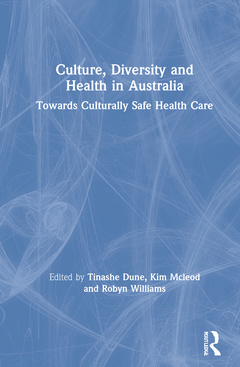Culture, Diversity and Health in Australia Towards Culturally Safe Health Care
Coordonnateurs : Dune Tinashe, McLeod Kim, Williams Robyn

Australia is increasingly recognised as a multicultural and diverse society. Nationally, all accrediting bodies for allied health, nursing, midwifery and medical professions require tertiary educated students to be culturally safe with regards to cultural and social diversity. This text, drawing on experts from a range of disciplines, including public health, nursing and sociology, shows how the theory and practice of cultural safety can inform effective health care practices with all kinds of diverse populations.
Part 1 explores key themes and concepts, including social determinants of health and cultural models of health and health care. There is a particular focus on how different models of health, including the biomedical and Indigenous perspectives, intersect in Australia today. Part 2 looks at culturally safe health care practice focusing on principles and practice as well as policy and advocacy. The authors consider the practices that can be most effective, including meaningful communication skills and cultural responsiveness. Part 3 examines the practice issues in working with diverse populations, including Indigenous Australians, Culturally and Linguistically Diverse Australians, Australians with disabilities, Australians of diverse sexual orientation and gender identity, and ageing Australians. Part 4 combines all learnings from Parts 1?3 into practical learning activities, assessments and feedback for learners engaging with this textbook.
Culture, Diversity and Health in Australia is a sensitive, richly nuanced and comprehensive guide to effective health practice in Australia today and is a key reference text for either undergraduate or postgraduate students studying health care. It will also be of interest to professional health care practitioners and policy administrators.
Part I: Understanding Culture, Diversity and Health 1.An Introduction to Culture, Diversity and Health in Australia 2.The Social and Cultural Determinants of Health 3.Cultural Models of Health and Health Care Part II: Culturally Safe Health Care Practice 4.Principles of Cultural Safety 5.Policy and Advocacy in Culturally Diverse Health Care 6.Culturally Safe Health Care Practice Part II: Working with Diverse Populations 7.Aboriginal and Torres Strait Islander Australians 8.Culturally and Linguistically Diverse Australians 9.Religious Diversity in Australia 10.Australians with Disabilities 11.Gender and Health 12.Australians of diverse sexual orientations and gender identities 13.Ageing Australians Part IV: Culturally Safe Teaching and Learning 14.The Future of Culture, Diversity and Health in Australia: Culturally Safe Teaching and Learning
Tinashe Dune is a multi-award-winning Senior Lecturer in the areas of health sociology and public health and is also a clinical psychology registrar. At Western Sydney University Dr Dune teaches in the Interprofessional Health Science program. Her research and teaching focuses on marginalised populations. This includes the experiences of culturally and linguistically diverse people, those living with disability, ageing populations, LGBTIQ-identifying people and Indigenous populations. Dr Dune utilises mixed-methods approaches and interdisciplinary perspectives, which support multidimensional understandings of the lived experience, health outcomes and empowered ways to improve wellbeing.
Kim McLeod is Senior Lecturer in the School of Social Sciences at the University of Tasmania. Kim is known for her expertise in philosophically informed and arts-based health research. Much of Kim’s work explores the social change that contributes to health equity and population-level wellbeing. Kim’s approach to understanding health as ongoing processes of change is presented in her single authored book, Wellbeing Machine: How Health Emerges from the Assemblages of Everyday Life. Kim brings a multidisciplinary approach to her research practice. She commonly collaborates with researchers from the Health Sciences, Humanities and Social Sciences on health-related research projects. Kim's teaching expertise is introducing health profession students to cultural safety and the social context of health. She leads collaborative research projects to explore best teaching practice in this area.
Robyn Williams has nursing and education qualifications and has over 37 years of experience of working with Indigenous peoples, primarily in the Northern Territory but also all over Australia. Her fields of expertise include cultural safety, effective communication, curriculum development and program implementation, evaluation of communi
Date de parution : 05-2021
17.4x24.6 cm
Thèmes de Culture, Diversity and Health in Australia :
Mots-clés :
Culturally Safe; Torres Strait Islander Peoples; Health Care; Health Professional; Torres Strait Islander; ACCHOs; Social Determinants; Diverse Sexual Orientations; Reflection Boxes; Health Care Practice; Australian Health; Traditional Chinese Medicine; PHC; Aged Care Facility; Health Care Providers; Common Language; CALD Community; Gender Diverse People; Aged Care Quality; Workplace Gender Equality Agency; AMS; CALD Background; Residential Aged Care; Midwifery Board; Torres Strait Islander Health



